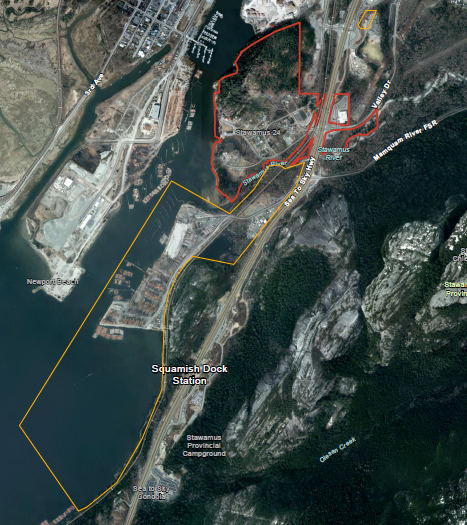The Squamish Nation Council and Nch’ḵay’ Development Corp. announced Wednesday their objective to develop land-use strategies and community capital plans across 140 hectares (350 acres) of their land in West Vancouver, North Vancouver, the Sunshine Coast and Squamish.
Council is placing a moratorium on receiving or considering third-party proposals for development on these sites for the next year, according to the Nation.
As real estate becomes one of the most profitable industries in Vancouver, Squamish Nation Council chairman Khelsilem said he hopes to utilize their land assets in a way that works towards the socio-economic goals of their community.
“For a number of years or decades, our community has sort of said, ‘Look at all this other wealth that's been generated through our territory, and when are we going to be able to benefit from that?’ I think that has propelled a commitment or a vision and an energy towards really exploring real estate as the future of economic development for our nation,” he told Glacier Media.
Over the next year the Nation will be assessing lands to create a capital plan and fully unlock the real estate value of their assets, which “as many people know, are very sizable,” said Khelsilem.
The Nation’s government, affordable housing provider and development corporation are set to work together to deliver mixed-use, residential, commercial and industrial development along with infrastructure.
The Nation has issued an expression of interest to identify firms who can help them source comprehensive land-use planning and development consultant services, said Nch’ḵay CEO Mindy Wight.
“The successful parties will help the Squamish Nation, Nch’ḵay̓ and Hiy̓ ám̓ Housing work with our community to develop a strategy for these lands; one that maximizes the potential financial value and community benefit,” said Wight in the media briefing.
Khelsilem told Glacier Media that the process will be an “open call” for firms to make proposals. A goal of the moratorium is to allow the Nation to approach development opportunities from a proactive position, rather than reactive position.
He described how development companies would approach the nation and lobby their council to engage in projects.
“The moratorium is really intended to communicate that we're not going to entertain anything for a year. Stop trying to lobby us on your great idea. We're going to actually engage in your own internal process, we have a team of experts to bring in, we're going to invest in exploring what is possible on our land and then after that we can then come out from a position of strength to say we have a vision for these lands,” Khelsilem said.
One site, which is located at the mouth of Capilano River, is the size of a small municipality, Khelsilem said.
“Together, the nation's real estate assets represent an opportunity to reshape the entire region of the North Shore and the Lower Mainland, but also to work with other jurisdictions for the betterment of all our communities,” he said.
Adding more affordable housing supply to the region's market is another important aspect of the plans to develop the various sites. When planning Sen̓áḵw, the Nation analyzed the land to understand the highest levels of density possible on the site.
“As a result of that, we were able to analyze and understand that around 6,000 units of affordable rental was the ideal amount to create a livable, sustainable community, but also to generate those long-term profits that are going to come back to the Squamish Nation community to fund our programs, services and our capital needs,” Khelsilem said.
Within the next year, the Nation will explore site feasibility to understand how dense potential developments will be. The hope is to build off the model of Senakw by partnering with municipalities in “good faith service agreements,” according to Khelsilem.
“We are at a stage of Nch’ḵay’s evolution. I'd say we've got capacity within our real estate team, we have significant experience and skills brought to the table and part of that will inform our process, our policies and how we engage going forward,” said Wight.
“I think there's lots of great takeaways that we put together from our process going through the Sen̓áḵw partnership with West Bank. We have the models, the approach and the key takeaways that we can inform potential partners and proponents in the future.”



